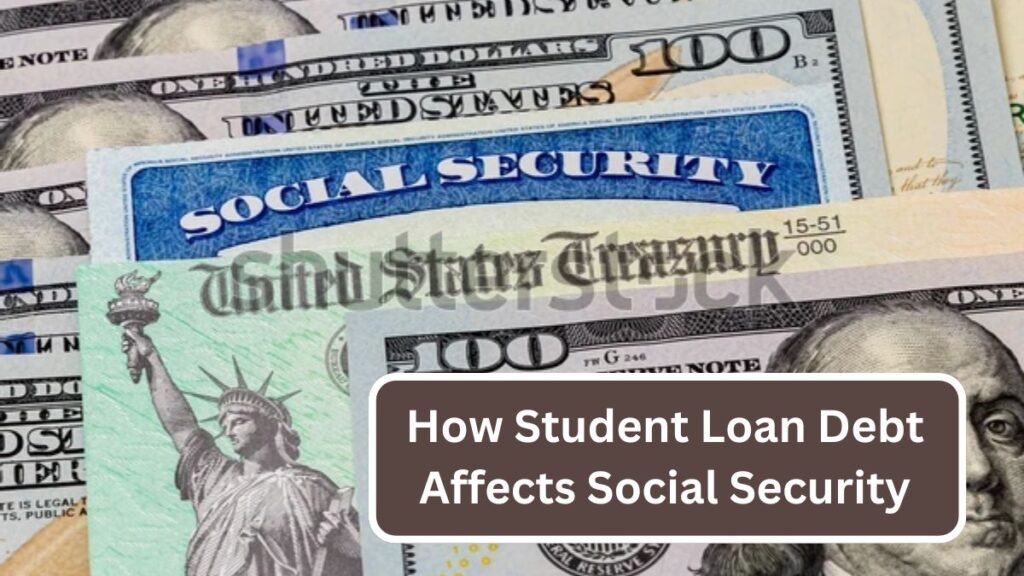Social Security is a crucial financial resource for most retirees in the United States, helping them cover their living expenses during retirement. However, changes in the system or unexpected factors can impact the amount of money retirees receive. One lesser-known but significant issue that can reduce Social Security benefits is outstanding student loan debt. In this article, we’ll explore how student loan debt can affect Social Security benefits and what retirees can do to protect their finances.
How Social Security Works for Retirees

Social Security is designed to provide a steady income to people once they retire. The amount of money each retiree receives depends on factors like how much they earned during their working years and when they decide to start collecting benefits. Typically, the longer you work and the later you claim your benefits, the higher your monthly payment will be.
Common Factors Reducing Social Security Benefits
Many retirees are aware that certain decisions, such as retiring too early or not working enough years, can lead to reduced Social Security benefits. For instance, if you don’t work for at least 35 years, some years will count as zero earnings, which lowers your overall benefit amount. However, these issues can often be managed by working longer or delaying when you start collecting benefits.
The Unseen Threat: Student Loan Debt

A surprising factor that can also reduce Social Security benefits is outstanding student loan debt. While most people associate student loans with young adults, many older Americans are still paying off loans they took out for education later in life. If you have unpaid federal student loans, the government can withhold up to 15% of your Social Security benefits to repay the debt.
| Topic | Details |
|---|---|
| Possible Causes of Reduction | – Medicare Premiums: Increased healthcare costs deducted from Social Security benefits. |
| – Early Retirement: Claiming benefits before full retirement age reduces monthly payments. | |
| – Taxation: Higher overall income can lead to taxation on Social Security benefits. | |
| – Debt Garnishments: Unpaid debts like student loans or taxes can be garnished from benefits. | |
| Impact on Retirement Plans | – Budget Adjustments: A $500 reduction may require changes in your retirement budget. |
| – Work Considerations: May necessitate delaying retirement or working part-time. | |
| – Housing Decisions: Downsizing or relocating to a more affordable area might be necessary. | |
| Strategies to Prevent Reduction | – Delay Claiming: Postponing Social Security until after full retirement age to maximize benefits. |
| – Increase Earnings: Working longer to raise your benefit amount. | |
| – Manage Debt: Paying off debts to avoid garnishments. | |
| Managing a Reduction | – Adjust Budget: Review and reduce expenses to accommodate the lower income. |
| – Explore Assistance: Look into programs like SSI, Medicaid, or food assistance. | |
| – Seek Financial Advice: Consult a financial planner for personalized strategies. | |
| Appealing a Reduction | – Filing an Appeal: If you believe the reduction is incorrect, you can appeal with the SSA. |
| Programs to Help Retirees | – Supplemental Security Income (SSI): For additional income if benefits are low. |
| – Medicaid: Provides healthcare assistance to low-income retirees. | |
| – Food Assistance: Programs like SNAP can help with food costs. | |
| Long-Term Impact Considerations | – Inflation: May reduce the purchasing power of your benefits over time. |
| – COLA Adjustments: Cost-of-living adjustments may not keep pace with inflation. | |
| Actions to Take | – Review Retirement Savings: Ensure your savings strategy is robust enough to handle reductions. |
| – Consider Delaying Retirement: Delaying retirement can help offset the reduction. | |
| – Seek Alternative Income: Explore part-time work or passive income streams. |
The Impact of Student Debt on Older Americans
Millions of older Americans carry student loan debt, either from returning to school later in life or from helping their children with their education. According to recent data, about 2.2 million people over the age of 55 still have student loans. Paying off these loans can be particularly challenging for retirees, who are often living on a fixed income.
How Student Loan Debt Affects Social Security

When Social Security benefits are garnished to repay student loans, retirees may lose a significant portion of their monthly income. For example, if a retiree’s monthly Social Security benefit is $1,907 and 15% is taken to repay a student loan, they would lose $286 each month. This can make it difficult to cover essential living expenses like housing, food, and medical care.
Financial Strain on Retirees
The financial strain caused by student loan debt is substantial. Many retirees who are still paying off their student loans find it hard to manage their finances, especially when their Social Security benefits are reduced. This situation is even more challenging for those who didn’t complete their education or didn’t see a significant return on their investment in education.
What Retirees Can Do
To avoid losing part of their Social Security benefits to student loan repayment, retirees should explore options to manage their debt before they retire. This could include seeking advice from financial advisors, consolidating loans, or exploring income-driven repayment plans that adjust payments based on income.
FAQs
What could cause a $500 reduction in my Social Security benefits?
A $500 reduction in Social Security benefits could be due to factors such as adjustments in Medicare premiums, taxation on Social Security income, early retirement penalties, or garnishments for unpaid debts like student loans or taxes.
How does early retirement affect Social Security benefits?
If you choose to start collecting Social Security before reaching full retirement age, your benefits will be reduced. This reduction could contribute to a $500 decrease in your monthly payments.
Can healthcare costs influence my Social Security benefits?
Yes, higher Medicare premiums can be deducted from your Social Security benefits, potentially leading to a reduction in the amount you receive. This could account for part of the $500 decrease.
What can I do to prevent a reduction in my Social Security benefits?
To avoid or minimize a reduction, you can work longer to increase your benefits, delay claiming Social Security until after full retirement age, and carefully manage any debts that could lead to garnishments.
Will my Social Security benefits be taxed?
Depending on your overall income, a portion of your Social Security benefits might be subject to federal taxes, which could effectively reduce the amount you receive each month.
Retirees must be proactive in managing their student loan debt to avoid reductions in their Social Security benefits. While it’s possible to mitigate some factors that reduce benefits, such as by working longer or claiming benefits later, student loan debt presents a more challenging issue. Staying informed, exploring all available options, and seeking professional advice can help retirees protect their financial future and ensure they have enough income to cover their needs during retirement.














